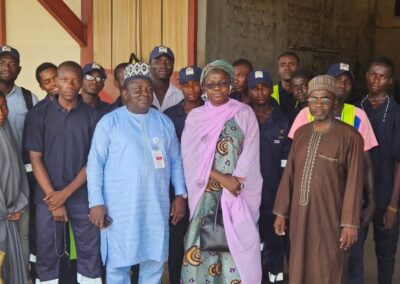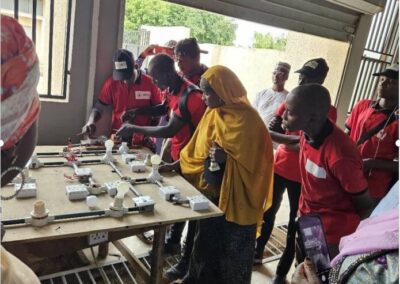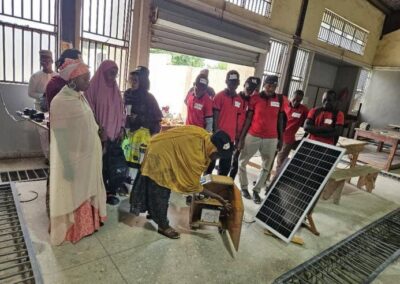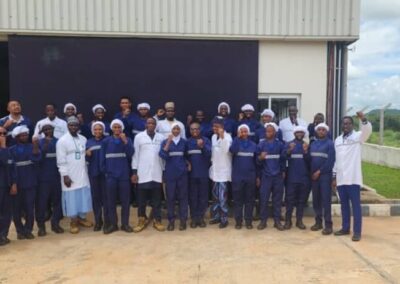Technical Skills Development Project (TSDP)
The primary objective of ITF-NECA Technical Skills Development Project and training programmes is the acquisition of relevant knowledge, practical skills and attitudes for employment and entrepreneurship in a particular trade or occupational area.



TSDP Mission
To promote Technical and Vocational Education and Training through Public Private Partnership in the provision of employable and entrepreneurship skills for national development
About TSDP
A critical challenge that faces Nigeria is the development of a competent workforce and sustained economic growth in the global economy. The challenge of unemployment, job creation and skills in order for jobs to become a reality for more people is likely to become accentuated as population increases and more youths leave school. As a way out of the impending national and global crisis, quality Technical and Vocational Education and Training (TVET) is widely recognized as having an important role to play in tackling youth unemployment.
Thus, the Industrial Training Fund (ITF) and Nigeria Employers’ Consultative Association (NECA) in a joint initiative, designed the TSDP to promote availability of manpower with appropriate technical and vocational skills to meet the identified needs of industries and the country. The TSDP was established as part of a Policy response to the outcome of a Joint Survey of “Contemporary Manpower Requirement in the Nigerian Economy” which was presented to the public in 2008. The Survey findings had highlighted manpower shortages as well as low competency levels in the following skill areas:
- Mechanical Maintenance: Pneumatics, Hydraulics, Machining and Pipe-Fitting (Plumbing)
- Welding: Production & Welding Maintenance
- Electrical/Electronic Maintenance
- Auto Mechatronics
- Automation and Process Control
- Instrumentation.
The primary objective of ITF-NECA Technical Skills Development Project and training programmes is the acquisition of relevant knowledge, practical skills and attitudes for employment and entrepreneurship in a particular trade or occupational area.
The Industrial Training Fund (ITF) and Nigeria Employers’ Consultative Association (NECA) have successfully implemented the Technical Skills Development Project (TSDP) since 31st March 2009.
One of the most important features of the TSDP is its orientation towards the world of work and the emphasis of the curriculum on the acquisition of employable skills. The ITF-NECA Technical Skills Development Project is, therefore, well placed to provide the skilled and entrepreneurial workforce that Nigeria needs to create wealth, reduce unemployment and poverty.
Strategic Objectives
- Provide employable and entrepreneurship skills to youth to address skills needed in the country
- Promote Technical and Vocational skills development for economic growth and development
- Demonstrate to Policy makers a functional and result-orientated model for employability and job creation
- To promote TVET through strategic intervention in Technical Colleges
- Set standards and monitor adherence in the implementation of the Project
Modus Operandi
The TSDP operates through the following:
- Participating Organizations: Provide skills training.
- NECA member-companies
- ITF Industrial Skills Training Centres
- Other select organizations
- Federal and State Technical Colleges in all the six geo-political zones and the FCT (through interventions – provision of equipment, tools for practical work; construction and renovation of workshops etc.)
Core Elements of the TSDP Training Programmes
The Training Programmes have three (3) core elements aimed at producing high quality, job-ready technical manpower.
- Classroom training and practical hands-on exercises.
- Industrial Attachment for practical experience in the world of work.
- Entrepreneurship Development. It is an integral component of the curriculum anchored on the International Labour Organisation’s (ILO) Start Your Business (SYB) Module. This is an internationally accredited Module. All TSDP trainees are equipped with life and job creation skills which enable them establish and manage their own businesses.
TSDP PARTNERS - ITF & NECA
Industrial Training Fund (ITF)
Industrial Training Fund is an agency of the Federal Government of Nigeria mandated by the Industrial Training Fund Act, as amended in 2011, to among others:
- Provide, promote and encourage the acquisition of skills in industry and commerce with a view to generating a pool of indigenous trained manpower sufficient to meet the needs of private and public sectors of the economy.
- Provide training for skills in management of technical and entrepreneurial development in the public and private sectors of the economy.
- Set training standards in all sectors of the economy and monitor adherence.
- Evaluate and certify vocational skills acquired by apprentices, craftsmen and technicians in collaboration with relevant organizations
The Fund has an expansive network of Forty-Two (42) Area Offices and Five (5) Industrial Skills Training Centres (ISTCs) spread over Nigeria with professional trainers equipped with expertise and experience in varied areas of profession.
The service offering of the Industrial Training Fund include the following:
- Engineering and Technical
- Information and Communication Technology
- Banking and Finance
- Health, Safety and Environment
- Management, Supervisory and Leadership
- Entrepreneurial Development program
- Specialized training programs based on specific needs
- Advisory and Consultancy
- Students Industrial Work Experience Scheme (SIWES) and Apprenticeship Scheme amongst others.
Nigeria Employers Consultative Association
The Nigeria Employers’ Consultative Association (NECA) is the foremost Business Membership Organization (BMO) in Nigeria. It was established in 1957 to provide the forum for government to consult with private sector employers on socio-economic and labour policy issues.
For over 60 years NECA has been the Voice of Business on varied and diverse issues that aims at improving the environment for enterprises to survive and flourish. It thus, provides a platform for private sector employers to interact with government, labour, communities and other relevant organisations in and outside Nigeria for the purpose of promoting harmonious business environment that will engender productivity and prosperity for the benefit of all.
NECA’s membership cuts across all sectors of the economy and comprises all sizes of business.
The strategic objectives of NECA include the provision of value-adding services to members as well as the promotion of human capital development.
THE POLICY THRUST OF TSDP
The Project strategically opted to use the “brown fields” approach for the skill acquisition programmes. This involves leveraging already existing facilities for Training.
NECA member-companies made available their technical training centres, while ITF complements these private sector Training Centers with its Industrial Skills Training Centres.
ADMINISTRATIVE STRUCTURE
- Policy Board: Responsible for policy making. It comprises Chief Executives of the ITF (Chairman) and NECA (Co-Chair) and four representatives each (not below the level of Director Cadre) from both organisations.
- Technical Committee: Comprising the four representatives as above, handle the technical and operational issues and report to the Policy Board.
- Project Desk: Situated at NECA, is responsible for the day-to-day administration of the Project.
TSDP OUTCOMES FROM INCEPTION
In the past fifteen (15) years, the TSDP has achieved several milestones and impacted positively on the economy by providing skilled Technicians and Entrepreneurs. Thus, contributed to:
BROAD OUTCOMES
- Job creation and reduction of unemployment
- Provision of skilled manpower for industries
- Development of entrepreneurs
SPECIFIC OUTCOMES
- Empowered over 8,000 youths annually with employable skills in over 30 (thirty) trade areas across the nation.
- 80% of TSDP graduates have either secured jobs in various industries or embraced entrepreneurship.
- Upgraded 10 Federal and State, Science & Technical Colleges through the supply & installation of modern training equipment and tools.
- Donated State-of-the-Art equipment, tools and consumables to Participating Organisations, thereby expanding their training capacity.
- Constructed and Renovated Training Workshops for 6 Government Technical Colleges.
- Empowered some graduates of the TSDP with Business Start-up Grants.
- Capacity Building for Instructors of some of the Training Centres on Pedagogy and Work-based Curriculum Planning Development.

Trade Areas
From an initial five (5) trade areas, the TSDP now provides training in thirty –five (35) trade areas.
- Agricultural Equipment Maintenance Work
- Apiculture
- Automation Maintenance
- Automobile Technology
- Auto – Diagnostics
- Automotive Vehicle Electronics
- Carpentry
- Construction
- Crop Production
- Culinary Skills
- Diesel Truck Repairs
- Electrical and Electronic Maintenance
- Fitter Machining
- Fishery
- Furniture and Woodwork
- Information and Communication Technology
- Instrumentation and Process Control
- Livestock Production, Poultry
- Masonry and Tiling
PARTICIPATING ORGANISATIONS
From six (6) Participating Organisations in 2009, the Project has so far worked with Seventy (70) Participating Organisations to date.
RECRUITMENT & SELECTION PROCESS
Each Training Centre places advertisement in the National Newspapers. Shortlisted applicants go through a selection exercise which covers Aptitude Test, Oral Interview and in some cases, medical examination.
DURATION OF TRAINING
The duration of the training programmes range from three (3) to eighteen (18) months depending on trade areas and Centre.
CHALLENGES
- One source of Funding
- Huge cost of technical vocational training
- High rate of unemployed youth that the Project cannot absorb
- Insecurity
- Government Policy
- Lack of awareness about TVET
- Career attitude to TVET
- Infrastructural deficit
20. Mechanical Maintenance and Machining
21. Mechatronics
22. Panel Beating
23. Pattern and Garment Making
24. Plumbing and Pipe Fitting
25. Photography and Videography
26. Refrigeration and Air conditioning
27. Scaffolding
28. Solar Panel Installation
29. Spray Painting
30. Snail Farming
31. Structural Design and Pipefitting
32. Telecommunications
33. Telematics
34. Welding and Metal Fabrication
35. Utility Maintenance and Operation
FUTURE THRUST OF THE TSDP
Since inception, the ITF-NECA Technical Skills Development Project has contributed to the development of skilled manpower, reduction of unemployment, promotion of entrepreneurship and job creation. In spite of what it has achieved, greater impact can be made with appropriate support at all levels to the issues of Technical Skills Development.
The transformation going on in emerging economies and developed countries of the world, could be traced to deliberate policies and support for youth empowerment, technical and vocational skills. If our nation must at the shortest possible time fast-track its development trajectory, concerted efforts must be given to this initiative. Therein lays the foundation of our national development, economic diversification and growth.
The ITF-NECA Technical Skills Development Project seeks the support of the Government and Critical Stakeholders for this initiative and model to maximally deliver greater solutions to our nation’s challenges. With the support of Government through policy and funding, the Project’s scope and outcomes of Job creation, reduction of unemployment and poverty alleviation would be up scaled and expanded for greater national impact.







